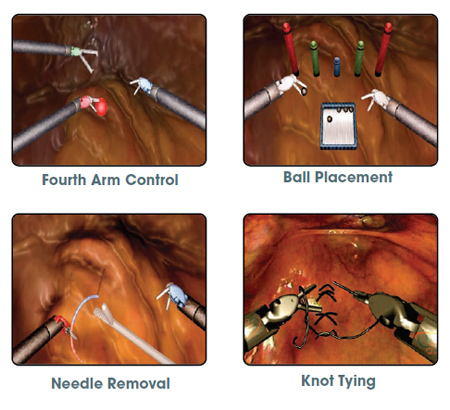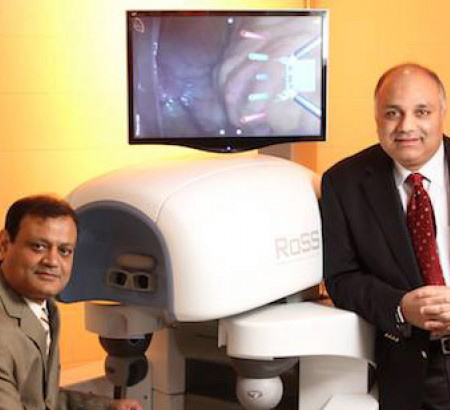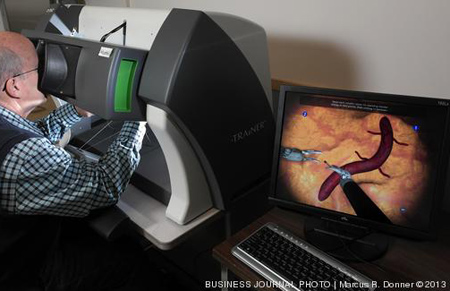With the number of robotic surgeries that take place every year rapidly increasing, the need for robotic surgery training simulators is quickly rising in parallel. In 2012 there were 367,000 robotic surgeries performed in the United States, more than 3 times the amount there were in 2008. Robotic surgery involves the use of computer controlled instruments attached to robotic arms, inserted into the patient through minimally invasive incisions, and controlled by human surgeons to preform operations. As with any surgical procedure, training is paramount in order to insure a high rate of success, however training for robotic surgery presents a number of new challenges that can only be overcome through the use of robotic surgery training simulators.
 |
| Robotic Surgery Simulator |
Intuitive Surgical’s da Vinci Surgical System is a popular example of a robotic surgery system that was designed to preform complex surgical procedures, through minimally invasive techniques, including:
- Prostatectomies
- Hysterectomy
- Cardiac Valve Repair
- Gynecologic Surgical Procedures
- Spleen-Sparing Distal Pancreatectomy
So how do surgeons train to operate this robotic surgical system that have extremely steep learning curves? Training simulators of course. With more than 2,000 of these robotic surgical systems sold worldwide, the demand for surgeons who are well-trained on robotic surgery systems is rising quickly. Robotic surgery training simulators are a proven way of creating this required supply of surgeons trained in the latest robotic techniques.
A recent article published in Urology, the Official Journal of the Societe Internationale D’Urologie, established that surgical trainees who receive simulation-based training demonstrate a higher level of precision during surgery over those who do not receive the same training. The article titled, Fundamental Skills of Robotic Surgery (FSRS): A Multi-institutional Randomized Controlled Trial for Validation of a Simulation-based Curriculum, seeks to develop and establish the effectiveness of a simulation-based robotic curriculum. The report concludes that by incorporating the FSRS into a virtual reality simulator, the approach is:
“a valid, feasible, and structured curriculum that demonstrates its effectiveness by significant improvements in basic robotic surgery skills”
The University at Buffalo, State University of New York, School of Engineering and Applied Sciences, in a partnership with the Center for Robotic Surgery at Roswell Park Cancer Institute, developed the RoSS (Robotic Surgery Simulator) that Urology used to conduct research and write the article on. The University of Buffalo, School of Medicine and Biomedicine Sciences, helped to develop and evaluate one of the first simulation-based training curriculum for robotic surgery. The simulator was developed by Thenkurussi Kesavadas, PhD, professor of Mechanical and Aerospace Engineering, and surgeon Khurshid Guru, MD, director of the Center for Robotic Surgery at Roswell Park Cancer Institute.
 |
| Developers Thenkurussi Kesavadas and Khurshid Guru |
Another company that is developing a robotic surgery training simulator is Seattle-based Mimic Technology. Their da Vinci Trainer and Skill Simulator replicates the controls of the real-world da Vinci robotic surgeon, allowing trainees to preform a number of surgical operations safely and risk-free in virtual reality. The simulator, which sells for just under $185,000, has sold more than 1,000 units. Mimic reports in a Puget Sound Business Journal Article that their domestic sales have doubled and their international sales have tripled in 2012, with projections for 2013 expected to exceed $10 million in overall sales.
 |
| Cauterizing blood vessels on a robotic surgery simulator. |
Robotic surgery training simulators teach surgical trainees the cognitive and motor skills that are required to operate robotic surgical systems, and preform robotic surgery at a high level of success.
![]() Contact us on ForgeFX
Contact us on ForgeFX![]() Get updates on Facebook
Get updates on Facebook![]() Get tweets on Twitter
Get tweets on Twitter![]() Connect on LinkedIn
Connect on LinkedIn
